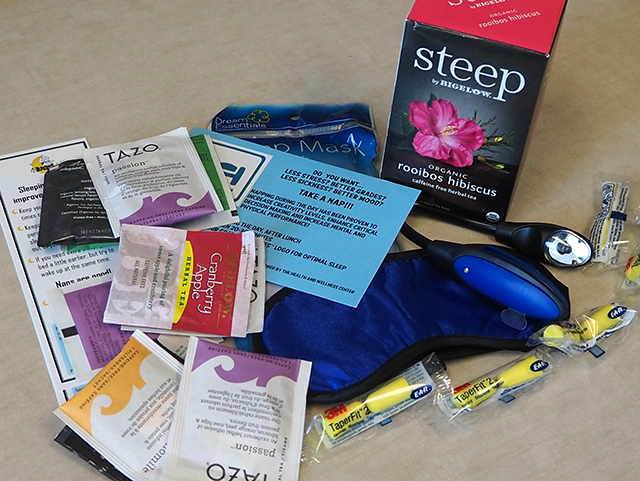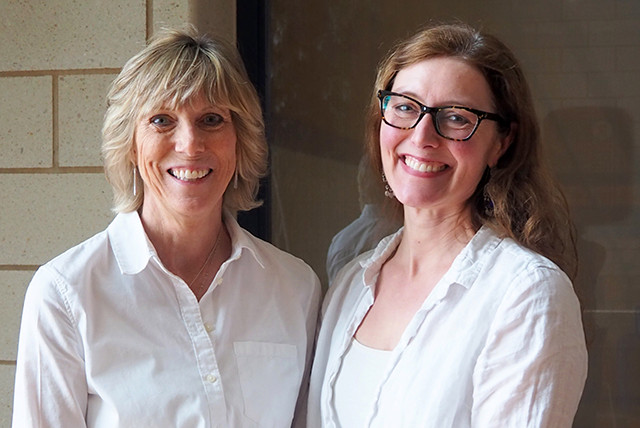

Photo by Gregory Pappas on Unsplash
Many colleges are developing programs that encourage students to pay attention to their sleep, or lack thereof.
Sleep is important to Brooke Offenhauser, but she didn’t realize just how important it was until she left home for college.
“I was lucky that my mom helped me make and keep a good sleep schedule in high school,” she said. Part of her mother’s healthy-sleep strategy included encouraging Offenhauser to go to bed and wake up at regular times — aiming for at least eight hours of sleep every night.
Offenhauser now believes this foundation helped her achieve in academics and extracurricular activities — and gave her a strong sense of emotional balance — but when she was growing up she took it for granted. “I didn’t really realize how important getting enough sleep was to my mental health or my overall health,” she said. “It was just how things worked when I was growing up.”
Then, when Offenhauser left her home in Cottage Grove for Macalester College, her life changed.
At Macalester, Offenhauser was on her own for the first time in her life. This meant that it was up to her to decide when she went to bed, when she woke up and how many hours of sleep she got each night.
“It is this new freedom,” she recalled. “You’re not used to it. It’s tough to keep a sleep schedule when you are trying to make friends and stay up and talk to them late into the night.”
While she was having a great time at college, this shift in sleep patterns, Offenhauser realized, “was starting to affect me emotionally.” Fatigue from her late nights was giving her anxiety, and she was afraid that those unsettled feelings were seeping into the rest of her life.
“I don’t know how much of an impact it was having on me academically or even socially,” she said. But in this exciting new environment, it was hard to keep up a commitment to good sleep: “If I wanted to go to bed, all these people were sitting right outside my room, talking or hanging out. I’d feel like, ‘What am I missing?’ I felt like I needed to stay up and make friends. I wasn’t getting enough sleep.”
Then, one day Lisa Broek, Macalester’s director of health promotion, paid a visit to “The Psychology of Right and Wrong,” Offenhauser’s first-year course. Assistant professor Steve Guglielmo had invited Broek to give a 10-minute presentation — the first in a series of three that would happen in his class during the semester — on the importance of sleep for maintaining physical and mental health.

MinnPost photo by Andy Steiner
At Macalester, Brooke Offenhauser was on her own for the first time in her life. This meant that it was up to her to decide when she went to bed, when she woke up and how many hours of sleep she got each night.
The program, known as the Macalester Sleep Well Initiative was introduced by Broek in 2011 as a way to help students (and faculty, by osmosis) understand the importance of sleep, and to provide tips for getting optimal shut-eye in an exciting new environment.
“I had no idea what health promotion was or who Lisa was,” Offenhauser recalled. “She came to our class and did a little sleep visit. She brought some stuff she called ‘sleep swag,’” The swag, delivered over the course of the semester, included sleep-enhancing tools like ear plugs, a sleep mask, a book light and a selection of herbal teas.
While some students might have seen Broek’s presentation as yet another version of the old “get some sleep” lectures they’d been hearing from their parents their whole life, Offenhauser said that the information felt useful and topical in her new collegiate life.
“The biggest thing that Lisa presented to the class when she came was the importance of getting consistent sleep,” she said. While she was getting “around 8 hours” of sleep every night, Offenhauser realized that it was spotty, with fewer consecutive nighttime hours, varied wakeup times and, occasionally, random, lengthy naps.
“My sleep was always inconsistent,” she said. “For me, that was a problem. I learned that I need more consistent sleep in order to feel healthy.” And when she took a closer look at her friends and classmates, Offenhauser realized that she wasn’t alone.
“I noticed that a lot of people who don’t get enough sleep are emotional,” she said. Living in sleep deficit can take a toll on a person’s mental health. She saw it in her friends and classmates: “They were taking things a lot harder than they usually would because they didn’t have that routine and consistency in their sleep.”
The draw of dorm social life was a major reason for Offenhauser’s late nights, so it was serendipitous that “The Psychology of Right and Wrong” was a residential first-year course.
“Half of the people on my floor were in the same class,” she explained. “They all heard the same information from Lisa. So one night, when I said, ‘I’m going to go to sleep,’ they understood what was going on. And they did the same thing, too.”
Awakening interest in sleep
Colleges and universities haven’t always focused on the importance of sleep. In fact, there was a time not all that long ago when it was a badge of honor in academic circles to talk about pulling all-nighters in order to finish up a paper or study for a big exam.
But changing perspectives on the importance of sleep, combined with growing concern about student mental health, means that many colleges have changed their tune and are developing programs that encourage students to pay attention to their sleep, or lack thereof.
When Broek started the Sleep Well Initiative, the national conversation around sleep on campus was focused on stress reduction. In the decade since, campus mental health experts have come to view sleep education as a form of prevention, a way of helping students build the strength needed to weather the challenges of college life.
“Mental health is about resilience and self-care,” Broek said. “Not to say that if you have a diagnosable mental illness you don’t need to get appropriate care, but getting ahead of it with programs like this one is a good way to help students maintain a more even balance.”
Encouraging students, especially first-years who may be more vulnerable to the stresses of campus life, to take their sleep seriously is an “upstream approach to mental health,” Broek explained. In her in-class presentations, she aims to show students that sleep “is not just this throwaway part of your day, like, ‘Sleep? I can do without that.’ It’s central to your overall health.”
And, she added, research backs her up, finding that extended periods of poor sleep can have a serious impact on a young person’s mental health: “We are looking at data that says if you have poor sleep as a college student, you are 17 times more likely to have anxiety symptoms and nine times more likely to have depression symptoms.”
With this kind of information in hand, Broek said it was easy to find professors willing to let her speak to their classes.
“I asked four faculty that I had a relationship with if I could do this little pilot project,” she said. The classes were all first-year seminars. “I felt like it was important to start getting at this early,” she said.

MinnPost photo by Andy Steiner
Some of the ‘sleep swag’ Lisa Broek provides to students.
Broek’s sleep chats lasted just 10 minutes each. The first session was general, about the importance of sleep and what constitutes healthy sleep. The second session was about things an individual can do to improve their sleep, and the third was about the importance of napping.
In order to gauge the usefulness of the program, Broek conducted brief pre- and post-test surveys with two control and two intervention groups.
“I thought, ‘I’m not going to find anything in this pre-test, post-test,” she said.
But when the results came back Broek learned that students who participated in the sessions reported seeing an overall positive change in their sleep behaviors. “The students’ knowledge about the importance of sleep went up dramatically. And their behaviors around sleep were more positive. It blew me away.”
With growing support from faculty and administration, Broek has continued the Sleep Well Initiative ever since. She visits first-year seminars, and the occasional upper-level course, bearing gifts of sleep swag and loads of helpful information about the importance of nighttime rest.
While 30 minutes of discussion over the course of a semester can lay a foundation for improved sleep habits, Broek said she also makes a point during each session to let students know that they can make an appointment with her for individual sleep counseling. And the college has a policy that any student can request to have sleep tools delivered to their campus mailbox free of charge.
“It’s just that important,” Broek said. “As a college, we are committed to it. We recognize that it just is fundamental, that it really is fundamental to overall success.”
Sleep champions
It turns out that sleep is an easy sell to many of today’s incoming students. They’ve grown up with parents like Offenhauser’s who spread the message that adequate rest is key to overall health. Many were the beneficiaries of parent-led campaigns to adjust school start times to better reflect the sleep needs of adolescents, and nearly all have been raised in an environment where they can feel comfortable talking about their mental health.
“They get it and they know it,” Broek said of the students she sees when she does her Sleep Well presentations. That’s a change from how young people behaved when she came to Macalester 23 years ago: “I’m always amazed. I ask at each of the classes that I go in to, ‘No shame. Raise your hand. How many of you are getting less than six hours of sleep?’ Maybe one. ‘How many get six to seven?’ A few. ‘Seven to eight?’ Majority. ‘More than eight?’ A few.”
The increased awareness of the importance of sleep is part of a national culture shift, Broek believes.
“I think the amount of education about the importance of sleep for success and grades and mental health — that’s happening around the country. The data’s there. It’s better grades. Less traffic accidents. Less fights in high schools if you start late. Many are familiar with the information.”
Curious to see if the information delivered in her first-year presentations sticks with students during their college career, Broek launched a study of sophomores who’d completed her Sleep Well program.
“I wanted to know — is this making a difference?” she explained. “So I interviewed sophomores who had been in the first-year classes, ‘Did they still know these skills? Were they practicing them?’ Again, I was amazed at how much they knew, at how much they were willing to practice.” The sophomores reported some barriers to sleep, Broek said. “They were the expected culprits: homework and electronic devices.”
Macalester geology professor Kelly MacGregor is an enthusiastic booster of the Sleep Well Initiative.
“In 2003 I had a 1-year-old baby,” she said. “I was starting this crazy new job. I didn’t have tenure yet, so there was lots of pressure.” For MacGregor, that pressure added up to a sleep deficit that continued after her second child was born. When she heard that Broek was bringing sleep information into the classroom, she was more than happy to have her pay a visit to her first-year seminar.
“I’ve always seen sleep as really important,” MacGregor said, “but it in my profession it wasn’t always viewed as acceptable to have that perspective. People talk about a lack of sleep as a badge of honor in academics. Saying, ‘I’m not getting enough sleep,’ was something to brag about.”
MacGregor found Broek’s tips and information helpful for her students — and for herself.
“I was so excited to see that there are these correlations between performance on tasks and memory and sleep and also the connection between mental health and sleep,” she said. “Lisa actually talks about this in the classroom. She’s provided that information to students and there have been years where some of them have reached out to her for individual sleep support.”
Paying attention to the needs of students outside of the classroom is part of seeing them as whole people, MacGregor said.

MinnPost photo by Andy Steiner
Macalester’s director of health promotion, Lisa Broek, shown with Kelly MacGregor, a Macalester geology professor who regularly invites Broek to come speak to her first-year classes.
“I spend class time talking about how important it is to take care of yourself and to find community. When I meet with students I talk about their courses, but I also ask questions like, ‘Who are your closest friends on campus?’ ‘What activities are you getting involved in?’ ‘What is your roommate situation?’ ‘Are you getting enough to eat?’”
MacGregor has found that many of her students, especially the student athletes, now come to campus committed to maintaining healthy sleep practices.
“Athletes are pretty rigid about their sleep.” she said. “They have pretty scheduled lives. They seem to be able to say, ‘I have to go to sleep at this time.’ Sleep takes that priority in a way that it didn’t when I was a college student.”
She thinks that growing comfort with talking about mental illness helps students feel comfortable talking about their concerns — and reaching out for help when they need it. This makes Broek’s program a good fit.
“Students are more willing to share and use the tools that are out there,” MacGregor said. “I like that. They understand that there are personal challenges that come and go in life and they are willing to talk about what they need to stay healthy.”
Now a junior majoring in neuroscience and psychology, Offenhauser said she no longer uses the eye mask that Broek brought to her first-year class, but she hasn’t abandoned her commitment to getting enough sleep.
As a member of Macalester’s Student Health Promotion Team, Offenhasuer sometimes tries to spread the gospel of sleep to her classmates: If you want to get the most out of college, she believes, don’t short-change your sleep.
“I notice it right away as soon as I get a little bit less than eight hours,” Offenhauser said. “I’m not at my best. It is the same for all of my friends as well.”